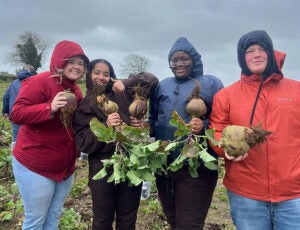The Institute of Competition Sciences has partnered with the National FFA Organization to launch an initiative that encourages students across the United States to explore the possibilities of agriculture beyond Earth. This collaboration brings the Plant the Moon Challenge to FFA’s extensive network, offering students a unique opportunity to engage with NASA, space exploration, and STEM in an innovative and hands-on way.
Inspired by NASA’s Artemis Program, the Plant the Moon Challenge allows students of all ages to experiment with growing crops in conditions similar to those found on the Moon.
Participants receive simulated lunar soil, known as lunar regolith, and are tasked with designing experiments to determine the best methods for cultivating crops in this harsh environment. Lunar regolith, the Moon’s top layer of fine, powdery dirt, poses significant challenges for agriculture due to its lack of organic matter and difficult nutrient accessibility.
The challenge is not only relevant to future space missions but also to addressing the increasingly difficult growing conditions faced by farmers on Earth. Students participating in the PTMC gain practical experience in crop science and agriculture, while also contributing to ongoing research that could one day support human life on the Moon.
Students are guided through the process by a Project Guide and a series of engagement activities, where they select crops, set experimental parameters, and track their progress over an eight-week growth period. Upon completion, teams submit their findings in a final project report, which is reviewed by scientists and NASA experts. The top projects earn prestigious awards, including the Best in Show, and high school participants have the chance to win a trip to the Kennedy Space Center.
Since its launch in 2021, the Plant the Moon Challenge has seen widespread participation, attracting tens of thousands of students from 44 states and 17 countries. The 2023 PTMC was notable for its inclusivity, with 44 percent of participants from Title I schools, 57 percent from schools where the majority of students receive free or reduced lunch, and 33 percent from majority minority institutions.
The challenge is further supported by a network of 25 NASA Space Grant Consortia, which help engage teams within their states and bolster professional development and aerospace curricula. A regional collaboration of six Space Grant Consortia in the southeast — West Virginia, Virginia, North Carolina, South Carolina, Florida, and Puerto Rico — led by the Virginia Space Grant Consortium, received additional support from NASA’s Office of STEM Engagement.
This backing has allowed the PTMC to expand across the country and pilot a regional symposium at the NASA Kennedy Space Center Visitors Complex, now being extended nationwide. Additionally, a Science Advisory Board of about 30 scientists, industry leaders, and NASA experts serves as judges, mentors, and curriculum reviewers for the program.
How does agriculture fit in?
The Plant the Moon Challenge is a transdisciplinary initiative that brings together agriculture and aerospace STEM, offering students an engaging and highly relevant educational experience. Both the National Science and Technology Council and National Science Foundation advocate for transdisciplinary education as a means to inspire students to pursue careers in STEM.

NASA scientists are deeply invested in learning how to sustain human life in space, including developing methods to grow nutritious food for astronauts. Researchers at Texas A&M University and Brown University have successfully cultivated chickpeas using lunar simulant, while scientists at the University of Florida have grown plants in regolith collected during the Apollo missions.
The challenge is not just an educational exercise; it mirrors real-world research that scientists are conducting to understand how crops respond to the harsh conditions of lunar regolith. The insights gained from PTMC experiments are valuable for advancing our knowledge of how to grow crops in space, and they have practical applications for improving agricultural practices on Earth.
In 2024, the Plant the Moon Challenge introduced new experiential awards for high school and professional participants. High school teams now have the chance to win a grand prize that includes a trip to the NASA Kennedy Space Center Visitor’s Complex, offering them a firsthand look at space exploration and aerospace career opportunities. College-level participants can win support to attend a professional conference of their choice, providing them with the platform to share their research and network with industry professionals.
For those interested in taking part in the Plant the Moon Challenge, registration is open until September 15th. More information and registration details can be found at Plant the Moon Challenge.


